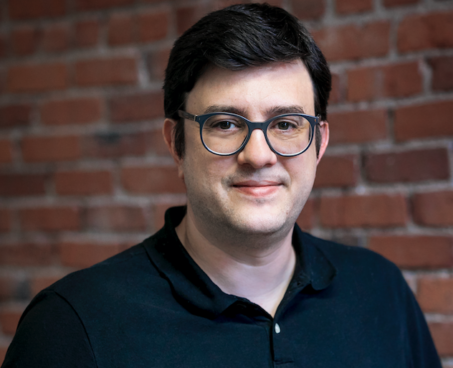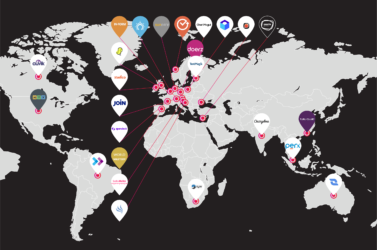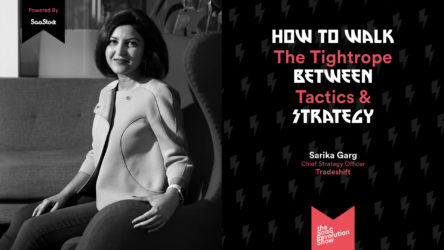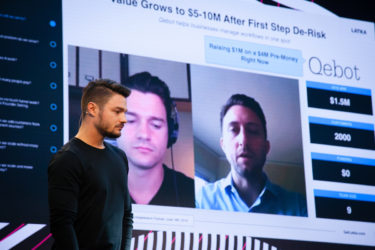The first quality that strikes you about Nikos Moraitakis is his directness. There is no sugar-coating or unnecessary political correctness with this SaaS CEO.
“No one ever came to work because of the ping pong tables. Even less so, stayed for them,” he tells me early in our conversation.
My initial attempt is to figure out how Workable uses Artificial Intelligence and what bright future lies ahead for the most hyped concept in SaaS. “The future is AI, where we prompt people what to do rather than make beautiful buttons hoping they click on them.”
To do interesting yet useful things with AI, you need the right engineers with the right mindset. However, having ping pong tables is not enough — and our conversation shifts to ways to attract those mindsets.
In discussing AI, I was trying to avoid the obvious conversation about recruitment, the industry Nikos’ company, Workable, serves. Workable processes 25 million candidates each year. Any way I approach the conversation of AI, it always comes back to talking about people.
You can tell people are his passion. But it’s not immediately obvious.
Ensuring he never takes himself too seriously, being realistic and establishing a culture of autonomy at scale are the topics that have occupied Nikos’ mind for the last five years. These pursuits are far more telling tenets of a great company than the ephemeral pursuit of bliss.
The unusual approach to hiring and building a great company Nikos has, becomes evident when he says that he has found more wisdom in the words of Dostoyevsky than in Ben Horowitz’s The Hard Thing About Hard Things.
“Companies are just like societies. To make them healthy, learning about human nature and politics will be more useful than reading business books,” Nikos tells me.
Workable certainly seems like a healthy company, boasting a 5.0 perfect review score on Glassdoor. “To build the greatest company you need the best people,” he says to me several times during our conversation. What does that mean in the eyes of Workable’s Co-Founder and CEO and how does he go about finding them? Let’s dig in.
Don’t take yourself too seriously
“The avocado on our breakfast is not ripe enough,” is one of the most negative comments on Glassdoor. A comment that provokes more laughter than anything else.
Workable, similar to other tech companies, treats its staff located in Athens and Boston, very well. Perks are there to make daily life a little easier; not a motivation to come to work every morning, nor a way of luring them to join in the first place.
The same goes for grandiose promises by technology companies.
“I have an allergy for the tech entrepreneurs that package their valuable solutions into something larger than life. They present it as if they are saving the world from the Armageddon. You cannot be Bruce Willis shooting down asteroids and building B2B software all at the same time.”
If you want to change the world, join the fire brigade or Médecins Sans Frontières. Not Workable.
Nikos is always direct with candidates about this: “You will sit an office, work on what are undoubtedly interesting problems with a pretty significant amount of data, designing a beautiful product on the way.”
To find more people to help him do that, he has always called it by its name — work.
Work, just like exercising, involves sweating and unpleasant moments. “It involves doing a lot of things that you would rather not be doing, but down the line, there may be something in it that may improve the way a lot of people work.”
That level-headedness proved vital when it came to hiring more technical roles.
Don’t overhype
Nikos applies a similarly pragmatic approach to the real application of the technologies within the tool. This is particularly important in more specialised roles such as data scientists or AI engineers. “You can’t just say to an engineer ’Hey, come here, we are doing AI.’ You may excite investors or customers, but not engineers.”
Pragmatism needs to be present every step of the way.
That starts by clearly explaining how the product leverages data processing, pattern detection, and machine learning. Once you sell that rather than the hype, you will get engineers interested. The more pragmatically you sell it, the more genuine interest you will get. If you hire using hype or bold statements, you end up with the wrong people, who are not the pragmatic people you need.
This is an example Nikos gives when it comes to those AI engineers:
“Hundreds of thousands of hires happen each year, which gives Workable a very rich data set of the processes of how hiring happens. It’s tempting to do fancy things like trying to determine which of the 100 candidates for a certain role is most likely to be hired. But rather, we focus on much more useful things. We observe the behaviour of recruiters and aim to recognise when they do certain tasks so we can begin to prompt them to do them at the right time and take away the need for them to remember.”
“I can package this by saying it’s fancy AI but instead what it is is intelligent automation, and that is exactly how I will sell it to you.”
Nikos is a firm believer that some of the greatest discoveries happened with humility. “The people who broke the Enigma code weren’t doing funky stuff. I don’t think the job ad Turing answered was very fancy.”
Know who you want
To get the right people though, you have to know who you want. And you have to determine it very early. Nikos asked himself questions like:
- What people do I admire?
- What are the characteristics that hint ability to thrive in a startup environment?
- What are the goals of different roles?
- What are the personal qualities they need to possess to execute goals successfully?
- What are the values of the company and what makes a candidate the right fit?
He then spent more time turning abstract notions and qualities into powerful and understandable characteristics.
A few months after founding the company, Nikos wrote a very clear nine-point blog post describing what he wanted to see in candidates. One of them was “We have to like you,” and elaborated:
Yes right, I do mean this in the highly subjective and unfair way that makes you feel you could be friends with one person but not another, even if they’re equal in skill, theoretically. I know, it’s not supposed to be like this in a meritocratic world, right? Hate to break it to you, but someone’s ability to blend in with a team, get along with them and build up some emotional reserves for a hard fight is going to determine their objective performance in the long term.
Spelling it out clearly for people helped him figure it out for himself. This didn’t read like a cheat sheet, rather a manifesto.
Here is what you can learn from Nikos’:
- Don’t look to enumerate skills, state clearly what you want — “We ask for things the candidate is unlikely to be familiar with. Startups are unpredictable, and your current knowledge will not be enough to carry you forward. At Workable, the one thing we’re trying to figure out is not who you are, but who you can be.”
- Explain why this is important in the context of your company — “We’re not looking for perfect answers to unfamiliar topics, we’re just checking to see if the lights go out when we ask for something you didn’t study in college.”
- Give clear examples what you mean — “We want to see a certain level of achievement. We don’t care about specific skills. What we care about here is one’s achievement relative to choices. Maybe you got it on your mind one day to learn painting, and you have paintings and gallery exhibitions to show for. It’s not relevant to our work, but it shows that you’re the kind of person who puts the effort and does well in whatever he tries to do.”
- Be honest about your expectations, what you look for and what you don’t — “We believe in pre-interview assignments. These can be “homework” problems to solve by email or a test at our offices. If you can’t be bothered to go the extra mile to land a good job, this is not the job for you. You need to be able to name a product you love or tell us what you hated about college. You need to have an idea of what you’re after in life, and most importantly what you want to avoid.”
- Connect all that to your values — “We want to see you cut through the bullshit. Overly polished people with canned interview answers may suggest a good effort on the candidate’s side (a good thing) but also suggest a lack of authenticity and confidence in one’s personality.”
Nikos knew he wanted interesting, curious and opinionated people who would defy his decisions and be unafraid to disagree with him. People who were different from him. People with the right motivation. People with strong opinions that are loosely held became something of a mantra.
Help candidates tell their story
The last pointer in the blog post was prompting people to tell him stories. “Active, accomplished people who care about what they do usually have stories to tell. If your 4 years in college or your 5 years in your first job or your photography hobby ever meant anything to you, if they were things you somehow cared about and thought about, you should be able to tell me a story or talk about it in a manner that wouldn’t be terribly boring in a fireside chat.”
That said, Nikos realised that people aren’t always good at telling their own story, even if they are interesting. The things that happen to them or the choices they made may not appear as brave or smart as they might to a bystander. So he would still need to help them see their life-choices as a determinant of who they are and what they think. He would do his homework by preparing the points he would want to ask about.
Workable employee number 40 was to be the company’s first recruitment manager. At this stage, being close with the founders was still viable, something Nikos knew would be necessary, as that person took over a very important role from him.
One person he interviewed was Eftychia Karavelaki, who was living in Amsterdam at the time. On the preliminary Skype call they had, Nikos said:
“You come from a small village in the North of Greece, then moved to Athens to study Sociology, then moved to a small village in the Netherlands, and ended up in Amsterdam, working for a huge company.”
Without pausing, Nikos asked three questions:
1. How did you end up there?
2. What went through your mind each time you moved?
3. What within you allowed you to take such big and brave steps?
As Eftychia told her story, Nikos recognised that international mindset he so clearly wanted to see in everyone he hired. Nikos had travelled the world himself. “You have to fly some miles literally and metaphorically to gain enough exposure to the world, observe it and understand how it works. It’s knowledge you have to accumulate yourself.”
At the time, in 2015, the Greek economic crisis was at its peak. Nikos asked Eftychia what she thought about it. “I am in Amsterdam, I am financially independent, and I am not exactly rushing to come back. What do you think?” she answered. “I see you are over-enthusiastic,” Nikos jokingly remarked. “But I like it.”
Knowledge about or care for the Greek crisis didn’t determine fit. Rather it unravelled deeply rooted dispositions — does this person see the glass half-full or half-empty? Scaling a company is such a roller coaster ride that you must have the positive view, even in the most daring of situations. The ability to see a bright future, regardless of the current situation, is what was hidden in that question.
After moving through the interview process Eftychia said yes to Workable and to Athens. She could see the bright future of the organization. Three years at Workable, Eftychia still asks everyone she interviews, on their perception of their current situation.
That question isn’t the only thing that Nikos instilled upon her.
Transfer who you are, not what you want
Once Eftychia was hired, the two co-founders needed to transfer all their hiring know-how — the philosophies that they had carefully thought about — to her. Reading the nine pointers or having a few meetings did not suffice. They had to approach this strategically, and over time.
Because just like Nikos hadn’t enumerated skills in his hiring manifesto, he wouldn’t spell out desirable or undesirable traits to Eftychia. He wanted her to get to know him, how he thought, how he saw the world and what defined a great company to him. Here’s how he and Spyros inculcated Eftychia:
- Informal gatherings. They used every opportunity to show her who they are. At times like breakfast in the common area at the Athens office. They also chatted at Workable parties. At each occasion, friendly chats led to to three people getting to know each other.
- Evaluate current employees. To provide clarity, both Nikos and Spyros would explain the things that appealed to them in certain employees and qualities and characteristics they had reservations about. These were more structured 1–1s that Eftychia had with both founders at least once a week, sometimes twice. Nikos would always offer examples of what fascinated him about current employees and gave examples that showcased opinion, decision-making ability and fortitude.
- Review resumes together. As Eftychia began recruiting, she would run a variety of candidate resumes by the founders, and together they would discuss them. A year on the job, Eftychia was hiring an office manager. There were two distinct types of candidates who applied; the politically correct “yes-people” and ones who were more opinionated, direct and clear. “The kind that gets angry, and may even swear.” Nikos overwhelmingly leaned towards the second kind. From then on she would always know that someone who was direct was a far better fit.
- Resist the temptation to be specific. One thing Nikos never did, was say what he didn’t want outright. For one, he didn’t want to instill biases that would prompt Eftychia to hire people who may be too similar to him or the rest of the organisation. But more than anything, he wanted to ensure autonomy in Eftychia as a recruitment manager. It was the secret to their collaboration. “It’s your thing, just do it,” he would say. The candidate had to feel right for her.
Building a founder/recruiter relationship takes time and should never be rushed.
To date, Eftychia has been responsible for the hiring of 140 people as Workable has scaled to 180 people. In her first year alone, she recruited 40 engineers.
Let them develop their questions so they can hear the answers they need
Nikos didn’t push what questions Eftychia should ask either. Stemming from the autonomy that Nikos encouraged, she developed her own questions. She avoided the generic interview questions like “What’s your greatest weakness”, “What are your strengths” or “Why I should hire you?” People tend to give socially desirable answers to these, which didn’t provide insight into a candidate’s true character.
Here is a sample of what she asks, but a word of warning: They are not intended to be replicated as they may not reveal the things that are important to you and your company.
- What are your hobbies? It’s a great ice breaker but also signifies more clearly than anything an appetite for life. Eftychia appreciates people’s appreciation about themselves, which can only manifest through spending time on something that feeds their souls.
- Why our company? The answer shows the values, the candidate has.More so, that question reveals practical things, like the amount of research they have done on the company. Curiosity is a big factor for Workable, and it can manifest in a myriad of ways. If they haven’t spent the time to do their research beforehand, this could play out in a lack of initiative down the line.
- Why are you leaving your current job? It shows what turned candidates off. If the same traits exist at Workable, then maybe the candidate won’t be a good fit. A big red flag? Bad-mouthing a former employer.
Allow for independent decision making
You have to dig deep. “If someone tells you that their greatest achievement is starting a family, ask them why.” The answer will reveal whether it is overcoming the difficulty or perhaps having beautiful moments like no other that matters to them. It will tell what their truth is.
Once you know the truth, you can make the decision.
“Difficulties” is an area Eftychia particularly focuses on during managerial interviews. What do they consider the most difficult part of their job? According to Eftychia, many people would say that complying with the many disadvantages of their teams has been their greatest difficulty. Since the most important value for managers in Workable is to be able to work with diverse teams and turn weaknesses into strengths, this answer offers a unique glimpse into how candidates are as managers. Recognising what different people are good at and focusing on that, rather than just output, is a key strength in Workable.
When it comes to managers, digging into how they have worked before and how they talk about work reveals a huge deal. It also will reveal how their values match with Workable’s. Micromanagement tendencies, arrogance and authoritative communication style are all things Eftychia aims to recognise early on. Once she does, they’re all deal-breakers for her.
In the end, the most important thing to instill in recruiters is the feeling that they have direct impact on the company.
The people behind hiring and recruitment can often be undervalued, deemed as unimportant to company success. That clearly has not been the case in Workable. The founders have made Eftychia feel as close to the company as they are. It’s how responsibility is fostered. Both founders have always kept their door open to her.
To allude to Nikos’ directness form the start: Buying ping pong tables is easier than building great managers. It’s very easy to buy fancy, shiny objects. It is also a dishonest way to attract people or artificially make them feel good.
Becoming a great founder and building a successful, respectful company is much more difficult. “It is easier to make you like me than it is to make you respect me.” It’s earned with scars, but it is a lot more valuable. Nikos earns that by not falling for the temptation of micromanaging but instead trusting. That in itself comes from having a more mature understanding of the world — something he has spent a lot of time doing.
Nikos Moraitakis is one of over 50 speakers we have already signed up for SaaStock18. Join our Insider Sale by March 31st to get a 2 for1 discount code on April 1st. By entering the Insider Sale, you also get the chance to win great prizes like platinum tickets, team tickets, and cool SaaStock swag.
- Special thanks to Eftychia Karavelaki, Whitney Klepadlo, Melissa Escobar-Franco and Christina Gialleli for providing additional material for this article.
This story is published in Noteworthy, where 10,000+ readers come every day to learn about the people & ideas shaping the products we love.
Follow our publication to see more product & design stories featured by the Journal team.




